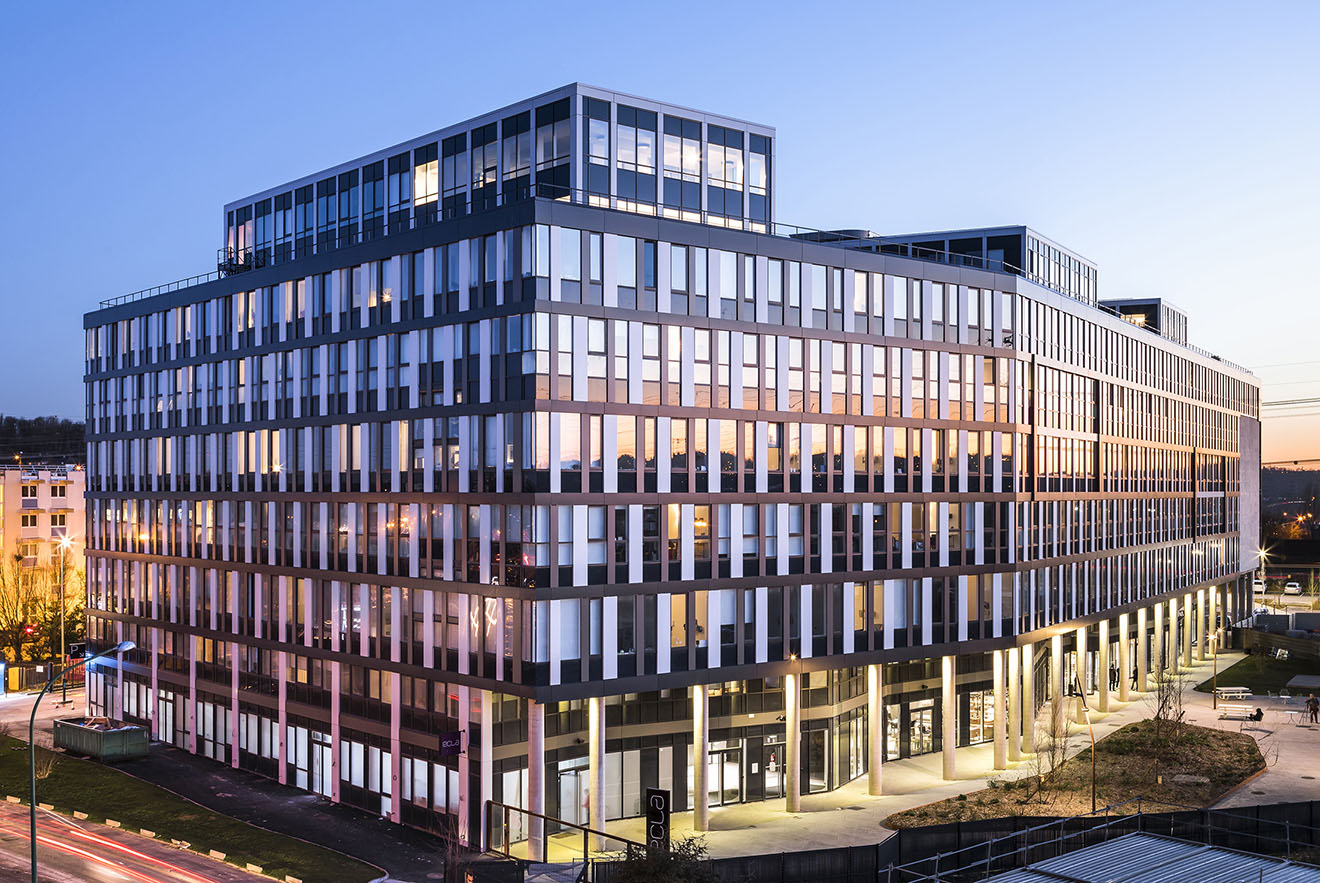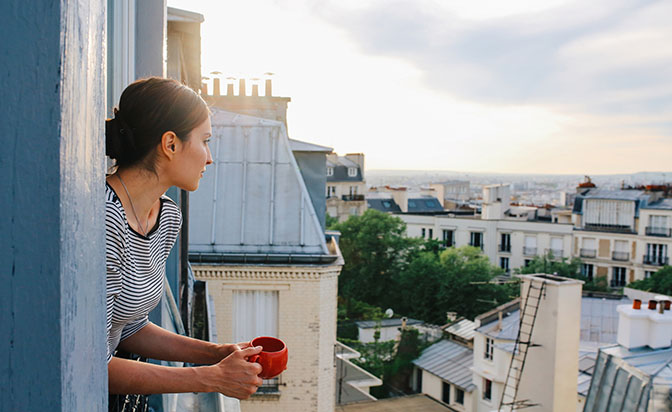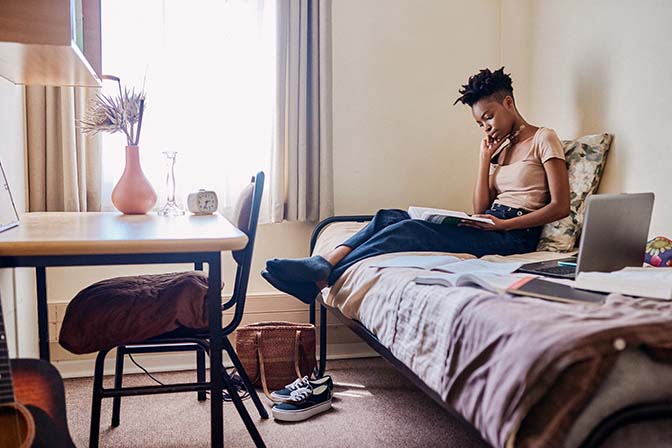Average rents
by housing type and according to regions
We offer you a price list of average rents according to the type of accommodation and the region to help you prepare your housing budget. It is important to realise that the rental of accommodation varies considerably depending on where it is situated. Accommodation in Orsay, for example, is less expensive than in Sceaux or Paris. In addition, rent can vary significantly depending on the type of accommodation, its floor area and its facilities.
Here are some average rents according to the size and type of the accommodation, but also according to its location in the Paris-Saclay region.
Survey based on the accommodation list put together by the Student Life and Social Action Unit in the Department of Student Life & Equal Opportunities. September 2020.
| Type of accommodation | Average floor area | Average monthly rent all taxes included |
|---|---|---|
| Orsay region | ||
| Studio | 20 m2 | 560 € |
| T1 (studio apartment) | 20 m2 | 620 € |
| T2 (one bedroom apartment) | 25 m2 | 750 € |
| Shared accommodation | 10 m2 | 510 € |
| Sceaux & Châtenay-Malabry region | ||
| Studio | 20 m2 | 580 € |
| T1 (one bedroom apartment) | 20 m2 | 605 € |
| Shared accommodation | 10 m2 | 625 € |
| Cachan region | ||
| Studio | 20 m2 | 640 € |
| T1 (one bedroom apartment) | 20 m2 | 645 € |
| Shared accommodation | 10 m2 | 655 € |
| Bedroom | 15 m2 | 635 € |
| Kremlin-bicêtre region | ||
| Studio | 20 m2 | 710 € |
| T1 (one bedroom apartment) | 20 m2 | 790 € |
| Shared accommodation | 20 m2 | 670 € |
| Bedroom | 15 m2 | 510 € |
| Paris 13th & 14th region | ||
| Studio | 20 m2 | 950 € |
| T1 (one bedroom apartment) | 20 m2 | 1010 € |
| Shared accommodation | 20 m2 | 710 € |
| Bedroom | 15 m2 | 530 € |
| Evry region | ||
| Studio | 20 m2 | 440 € |
| T1 (one bedroom apartment) | 20 m2 | 715 € |
| Shared accommodation | 10 m2 | 480 € |
| Bedroom | 15 m2 | 525 € |
| Saint-Quentin en Yvelines & Versailles region | ||
| Studio | 20 m2 | 575 € |
| T1 (one bedroom apartment) | 20 m2 | 715 € |
| Shared accommodation | 15 m2 | 480 € |
| Bedroom | 10 m2 | 525 € |
Additional expenses
When looking for a place to live, keep in mind that rent is not the only expense to budget for when moving into your accommodation. It is important to take into account any additional costs so that you are best prepared. In addition to rent, you may have to pay not only monthly utility bills and fees, but also expenses related to moving into your accommodation such as agency fees or a security deposit.
DangerPlease note: if some residences do not charge you for cold water, they will charge you if you use a lot of hot water Therefore, be aware of the charges shown and your consumption.
Reservation fees
Some landlords will charge you a fee to reserve your accommodation. CROUS, for example, will ask you for an advance on the rent in order to secure your accommodation. In 2020, this was an advance on the first month's payment of a flat rate of € 100. It is refundable provided that any cancellation is made before the date of acceptance.
Charges
Most rental fees in student residences are TCC, which means 'all charges included' (toutes charges comprises). This means that they are included in the advertised rent. However, some residences and private individuals offer HC rents, which means 'excluding charges' (hors charges). In this case, you will need to find out how much the charges are in addition to the rent. These are usually for water, electricity and heating. The charges can be between € 50 and € 70 per month.
Administration fees
Administration fees vary between € 50 and € 300 depending on the landlord. CROUS do not ask for any administration fees. This sum is paid by the future tenant to the landlord in order to cover any administration to do with the registration of the housing application, related documents and compilation the rental file.
At the end of the year, do not forget the residence tax required in some residences and in the majority of private rentals. (In progress)
The security deposit
The security deposit is a sum paid to the landlord directly by the tenant or through a third party ('Action logement' or 'Fonds de Solidarité pour le Logement') before moving in. It should be mentioned in the lease. The security deposit amount varies from between 1 and 2 months rent (excluding charges) depending on the type of accommodation concerned (furnished or unfurnished). The security deposit is a sum intended to cover any damage noted at the time of your departure which is directly attributable to you (normal wear and tear of the rented property should under no circumstances justify a non-refund of the security deposit). This sum should cover all or part of your rental debt at the time of your departure. Except in the case of major damage or unpaid rent, the security deposit will be reimbursed to you in whole or in part once you have left - at the latest 2 months after you have returned the keys. In order to avoid any dispute with your landlord, particularly with regard to the return of the security deposit, it is essential that the inventory of fixtures and fittings at the start and end of the rental period be carried out accurately and rigorously, as the comparison between the two constitutes a legal means for the landlord not to reimburse any sums initially paid by the tenant.
The surety
A surety is always requested by the landlord or owner. Please note: a surety should not be confused with a security deposit. Unlike the security deposit, a surety is not a payment of money as such. It is not for covering the costs of any material damage. The deed of guarantee, or surety, is a legal act which establishes an obligation on the part of a third party (natural or legal person) - commonly referred to as the 'guarantor' - to pay rent in the event of failure or default on the part of the principal tenant to do so. It is therefore a transfer of debt from the main tenant to the guarantor. Please note that in almost all cases, once the debt has been settled with the landlord, the guarantor will request reimbursement of the claim from the principal tenant.
Be careful of insurance providers offering a very low-cost package. The less you pay, the less likely you are to be covered. All insurance providers should cover you for fire and water damage. However, If you take out a more expensive package, the insurance will cover other everyday losses or accidents such as theft, vandalism, emergency repairs or disasters. For shared accommodation, some insurance companies offer the option of charging a little more so that the co-tenant is covered as well, which is often a good idea.
Insurance
All tenants moving into either public or private accommodation must take out home insurance. Several insurance companies offer special packages for young people and students. Insurance payments can be annual or monthly. The price varies according to the property and damages covered, as well as the type of accommodation. A T2 or T3 will of course be more expensive to insure than a T1 for example. Here are some home insurance providers offering student rates
| Insurance | Activites | Prices for 2020 |
|---|---|---|
| Basic package for a T1 | ||
| ADH | Fire, Water damage, emergency repairs | 23.50 € per year + 9.5 € for a co-tenant |
| ADH | Fire, Water damage, emergency repairs, theft, vandalism, broken windows | 41.40 € per year |
| MAAF | Fire, Water damage, emergency repairs, theft | 55 € per year + 9 € for a co-tenant |
| AXA | Fire, Water damage, repairs | 6.33 € per month |
| StudyAssur | Fire, Water damage | 23.45 € per year + 7.5 € for a co-tenant |
| Smeno | Fire, Water damage, theft, broken windows, disasters | 66 € per year |
| Basic package for a university residence | ||
| AXA | Fire, Water damage, repairs | 33.40 € per year |
| Smeno | Fire, Water damage, theft, broken windows, disasters | 29 € per year + 23 € for a co-tenant |
Unforeseen events
Occupying a dwelling exposes you to the unforeseen events which can occur in the life of a tenant, such as a water leak or a broken key in the lock. Your insurance may provide cover for several types of accidents, but in certain circumstances you may have to call in a locksmith, plumber or electrician yourself. Some residences offer to contact such professionals directly if you alert them to the problem. Other residences and landlords ask you to sort it out yourself. If the damage is the result of a mistake, an oversight or an accident on your part, you will generally have to pay the cost of the repairs or even the service charges yourself. Set aside some 'emergency' money which you could use in the event of an (expensive or otherwise) unforeseen event or accident.
Services and facilities
Most residences offer various services and facilities to tenants. The latter may be included in the rent, or paid for separately. Shared washing machines, electrical appliances on loan, internet connection, sports facilities, a cleaning and caretaking service and parking can be included in the rent, or be subject to supplements to be paid separately. Find out about the services offered in the accommodation. If they are not included in the rent, set aside a monthly budget so that you can access those which are of interest to you.
Housing assistance
As you can see, accommodation is expensive and all the costs amount to a sum which must be accounted for. However, there are several types of financial and social assistance available which can help you find accommodation and pay for any charges and expenses with peace of mind. These are the ones you can use if you need to
APL - Personalised Housing Assistance
APL is for individual students or couples, with or without dependants, living in subsidised accommodation in mainland France.
CONDITIONS FOR ACCESSING APL
- The student must be French. Foreign students, on the other hand, must have a valid residence permit
- The dwelling must be appropriate ( ee the sub-section on 'substandard and unsubsidised accommodation )
- The tenant must not be related to the landlord of the property
- The student must have financial resources (salary, grant, support payments received, etc.) below a certain level.
CAF assistance National Fund for Family Allowances
Please note that CAF housing benefits cannot be combined with each other. In addition, they are not retrospective. The level of assistance varies according to the amount of rent, the financial resources available to the student, the nature of the accommodation and the place of residence. In the case of shared accommodation, each tenant can benefit from CAF assistance. In order for this to happen, the accommodation must be lived in for at least 8 months of the year.
ALS - Social Housing Allowance
ALS is for individual students or couples without dependants.
THE CONDITIONS FOR ACCESSING ALS
- Resident in France,
- The accommodation must be your primary place of residence
- The accommodation meets health and habitation standards
- Foreign nationals must have a valid resi- dence permit
- Allocation of ALS depends on certain variable thresholds according to the composition of the household and the location of the accommodation
FSL - Housing Solidarity Fund
Fund The Housing Solidarity Fund is part of the housing assistance provided by CAF. It is for people who are experiencing financial difficulties in accessing or maintaining housing. This support is provided in the form of loans or grants. It can be used to meet the cost of a security deposit, the initial rent, insurance, moving expenses, debts, charges and bills. The total amount issued by the FSL will vary according to the département. The assistance does not take into account housing benefit income, start-of-school allowances and education allowances for a disabled child.
WHO CAN ACCESS FSL ?
- The tenant and the sub-tenant
- The owner occupier
- People accomodated free of charge
- People who live in a hostel as their main place of residence
ALF - Allocation logement à caractère familial
The ALF is intended for students who are isolated or in a couple with dependents.
WHO CAN ACCESS ALF ?
- Those receiving family benefits or an education allowance for disabled children
- Les personnes ayant un enfant âgé de moins de 21 ans et qui ne bénéficient pas de prestations familiales ou de l’allocation d’éducation de l’enfant handicapé
- Those looking after a senior citizen aged over 65
- Couples married for less than 5 years who do not have any dependent children
- Individual women who are more than 4 months pregnant or who are in a couple and who do not have any dependants
THE CONDITIONS FOR ACCESSING ALF
- Foreign nationals must have a valid residence permit
- The tenant must not be related to the land- lord of the property
- The allocation of ALF depends on certain variable thresholds according to the composition of the household and the location of the accommodation
Other financial assistance
AILE - Aide à l’installation dans un logement pour étudiants
The city of Paris offers € 900 for first time accommodation in private rented accommodation in Paris. This assistance is managed by CROUS in Paris. It is open to scholarship students enrolled at the Académie de Paris, de Créteil or de Versailles who are living in Paris.
WHO CAN ACCESS AILE ?
- Studen ACCESS THIS ASSISTANCE? grounds ts granted scholarships on social or receiving a Specific Assistance Annual Allowance (Aide Spécifique Allocation Annuelle) by CROUS in Paris, Créteil or Versailles,
- Holders of a lease for accommodation in Paris signed between 1 June and 31 March N+1.
Allocation exceptionnelle
This one-off assistance is intended for people in temporary financial difficulties or in the event of a disaster requiring emergency accommodation. This benefit cannot be renewed on a regular basis. To benefit from this assistance, you must contact the CASVP (Centre Action Sociale de Ville de Paris) branch of the arrondissement in which your residence is located.
WHO CAN ACCESS ALLOCATION EXCEPTIONNELLE
- You must have lived in Paris for at least a month
- You must prove the legality of your stay in France
Paris Logement
This allowance, which cannot be combined with other municipal housing assistance, is divided into three parts
- Paris Logement,
- Paris Logement Famille (family)
- Paris Logement Famille Monoparentales. (single parents)
- 84 €/month to a single person,
- 95 €/month for a couple without children
- et 116 €/month for couples with children
THE CONDITIONS FOR ACCESSING PARIS LOGEMENT
- You must be over 18 years of age.
- You must be a foreign national or have a valid residence permit.
- You must be a tenant, a co-tenant, becoming a property owner or a property owner (this last case only concerns families).
- You must receive or be entitled to receive housing assistance from CAF.
- You must have lived in Paris for at least three years, either on a continuous basis or not.
- You must not have any outstanding bills.
- You must be the leaseholder of the dwelling occupied as the main tenant.
- You must have lived in Paris for at least one year for couples with a dependent child in the case of a professional relocation enforced by your employer.
- You must have a monthly income of less than or equal to 1,210 € for single persons and an income of less than or equal to 1,600 € for couples with a dependant child.
- You must be spending at least 30% of your income on housing costs. The income taken into account is that of all the people living in the accommodation.
- You must have applied for the housing allowance and met the legal standards concern- ing sanitation and space.
Loca-pass
The Avance Loca-pass allows you to pay the security deposit requested by the landlord. There is no interest charged on the amount loaned and it is repayable over 3 years. The total amount can be up to a maximum of 1,200 €. It is available for young people under 30 years of age, employees in the non-agricultural private sector, job seekers and those in vocational training.
THE CONDITIONS FOR ACCESSING THE LOCA-PASS
- You must be a state scholarship holder or student with a fixed term contract, several successive fixed term contracts or a training agreement of at least 3 months in the last 6 months,
- The accommodation must be your primary residence, be located in France and rented with a lease with respect to French law.

Visale
This assistance covers the rental deposit and is managed by Action Logement. It is aimed at young people aged 18 to 30 years. It provides the beneficiary with tailored assistance to repay debts in the event of non-payment. 'Unpaid rent' refers to rent and charges listed in the lease, including their contract revision.
THIS ASSISTANCE INCLUDES
- Coverage of unpaid rent for the entire duration of the rental period, up to a limit of 36 unpaid monthly payments. For students and work-study students living in APL-approved housings or in a student university residence, the coverage is for nine unpaid monthly payments.
- Coverage of the cost of repairing the accommodation in the event of damage caused by the tenant, up to a limit of two months' rent and charges.
- No deductibles or waiting periods, subject to the reporting deadlines and the conditions of the Visale contract being respected.
- Coverage of the costs of legal disputes and procedures by a network of professionals.
THE CONDITIONS FOR ACCESSING VISALE
- You must be between 18 and 30 years of age.
- If you are over 30 years of age, an employee of a private agricultural company or posses and offer of employment
- The lease must comply with the law.
- The rent including charges must be a maximum of 1,300 €, or up to 1,500 € in the Ile-de-France.
- The lease must not be covered by other guarantees or be between members of the same family.
- The lease must be separate for each co-tenant in the case of a joint tenancy.
- The accommodation must be the ten- ant’s primary place of residence.
- The accommodation must be located in France.
- The maximum rent including charges must be equal to 50% of declared monthly income or 600 € for students and work-study students, and up to 800 € in the Ile-de-France
Mobili-Jeune
Mobili-jeune assistance is for young people below 30 years of age and helps to reduce the rent receipts. It is aimed at young people on an apprenticeship or professional training contract in a non-agricultural private sector company. The total amount of assistance is between € 10 to € 100 per month over three years and can be combined with the ALS and Loca-pass.
THE CONDITIONS FOR ACCESSING MOBILI-JEUNE
- You must not already have an ongoing Aide Mobili-Jeune file with Action mmodation Logement for the same accommodation and the same period.
- You must be a tenant in accommodation at the time of training. As regards the accommodation, it can be a shared rental in private or social housing, a furnished or unfurnished rented property, accommodation in a hostel or social residence, in a property with or without an APL agreement, in a sublet but only if this is in private housing or a hall of residence.
- Have a gross monthly salary less than or equal to 100% of the minimum wage.
Memo
Assistance from the CAF, Paris city council and Action logement are the main forms of assistance you can apply for as regards your student housing. This assistance can be combined with a grant from CROUS based on social criteria. CAF You can try out your eligibility on the CAF website and find out the total value of the assistance available to you.
Other financial assistance exists in addition to housing assistance. To find out about this, we suggest that you look at the Guide for Students where you can find out more information about the financial and social support available to you.
Finally, if you are experiencing financial problems, unforeseen circumstances or an emergency situation, do not hesitate to contact the social workers. They will support you in finding the right assistance for your situation.
Scholarship and financials aids
In summary
the total cost
of renting
Here are two example scenarios to give you an idea of how much accommodation will cost :
For a studio of approximately 20 m2 rented from a private landlord in Orsay or the surrounding area:
You should put aside each month:
560 €
for rent and charges (excluding any assistance to which you may be entitled)+ 100 €
on average of additional services (laundry, cleaning, gym, etc.) and monthly insurance depending on the options chosen= 660 €
At the time of your arrival in the accommodation , you will have to pay :
560 €
for the first rent+ 500 €
as a security deposit ( which is the same as the first rent excluding charges). At the end of the lease, if there are no outstanding payments or damage, you will get this amount back+ 200 €
for administration fees (depending on your application period these fees may be waived)= 1260 €
Do not forget residence tax each year, which ca be between
30 and 110 €.
(in progress) www.service-public.fr/particuliers/vosdroits/F42For a studio within a university residence in Orsay or the surrounding area:
You should put aside each month:
450 €
for rent and charges (excluding any assistance to which you may be entitled) and+ 10 €
on average for laundry+5
for home insurance per month= 465 €
Internet access is free depending on the agreement drawn up by CROUS with the internet supplier
At the time of your arrival in the accommodation you will have to pay
450 €
for the first rent+ 400 €
as a security deposit ( which is the same as the first rent excluding charges). At the end of the lease, if there are no outstanding payments or damage, you will get this amount back= 850 €
A 100 €.
reservation fee may be requested before your arrival. This will then be deducted from the first rentyou will have to pay when you arrive.



